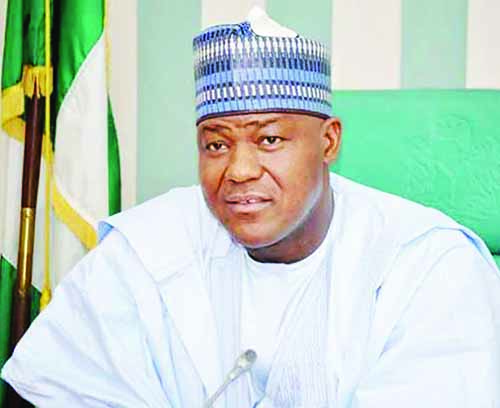Magnus Eze; Okwe Obi, Abuja
Speaker of the House of Representatives, Yakubu Dogara, has taken all the nation’s political parties to the cleaners.
He described them particularly his ruling All Progressives Congress (APC) and the main opposition, Peoples Democratic Party (PDP), as weak, unstable and lacking functional party apparatus.
He said the parties suffered from low organisational capacity and internal democracy.
The Speaker spoke at a two-day retreat on the dynamics of managing political parties professionally organised by the Political Parties Leadership and Policy Development Centre of the National Institute for Policy and Strategic Studies (NIPPS), Kuru, Jos, Plateau State.
He accused some of the political parties of embellishing their manifestoes with things that were untrue.
According to him, some political parties packaged enticing manifestoes with the sole aim of capturing or holding on to power only to abandon such manifestoes when they were in position of power.
Represented by the Minority Whip, Yakubu Barde, the Speaker posited that such weak political parties could not support democracy as political parties were expected to serve many important functions in bringing about good governance.
Dogara said this amounted to political malpractice for an elected government to govern without making reference to the manifesto which the party placed before the electorate and formed the basis for its election.
He stressed that political parties must ensure that they related their manifestos to a strategic framework carrying the development vision of the nation.
He posited: “For political parties to effectively play the central role in a democratic representation, they must be managed and operated in such a manner as to establish trust among the electorate.
“In Africa and Nigeria in particular, political parties are weak, lacking not only a stable and functioning party apparatus, but also a clear programmatic appeal. They also suffer from low organizational capacity and a lack of internal democracy.
“Such weak political parties cannot support democracy as parties are expected to serve many important functions, including citizen mobilisation, interest aggregation, public policy formulation, leadership recruitment and government organisation.
“At the level of individual party capacity, a number of challenges also stood out.
“These include lack of an inclusive and research based policy and manifesto development process that provides a clear policy framework for them to govern, lack of ideological or institutional identities, and limited competence in research and analysis that looks at their own performance and supports clear plans and strategies for building the party.
“These apparent weaknesses of political parties in Nigeria underline the need for reform and professionalism.
“By professionalism, we mean an institutional process by which professionals become more central to the running of our parties.
“Currently, our parties in Nigeria could do with better professional organisation of their operations.
“It is important that we organise our political parties along the lines of proper functioning bureaucracies, set up functional organizational structures and hire professionals to run the administrative aspects of the parties we support party leadership in the general running of our parties.”
Dogara continued: “It is worthy to mention that in an attempt to either capture or hold on to power, some political parties have sometimes embellished their manifestos with unrealistic promises.
“It is a political malpractice for an elected government to govern without reference to the manifesto that was placed before the voters which essentially formed the basis of their election. Political parties must ensure that they relate their manifestos to a strategic framework which carry the development vision of the entire nation.”
Senate President, Bukola Saraki, advocated for inclusiveness in the management of political parties in the country.
He noted that there was need to bring on board vulnerable groups in political management in the interest of the nation’s democracy.
Represented by Chairman, Senate Committee on Media and Public Affairs, Abdullahi Sani, the Senate President said: “It is important that we work to actively bring in more vulnerable and under-represented groups to actively participate in the political system.
“The youth, women and people living with disability are groups who must be actively engaged and effectively mentored for leadership in both the local, state and federal levels.
“We must break down all barriers that limit participation and whole heartedly embrace new entrants into the political space.
“That is why the National Assembly passed the not too young to run and independent candidacy clauses during our constitution review exercise.
“We must realize that the more people we have participating in our politics, the wider the field and the better and more refined the candidates.”
Acting Director General of NIPSS, Jonathan Juma, said the retreat was organised to enhance the competitiveness and effectiveness of players in a multi-party political dispensation.
He said: “That it is only in this way that opposition parties can be competitive and the ruling party sustainable when they lose power.”

